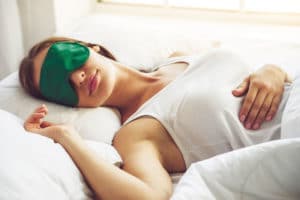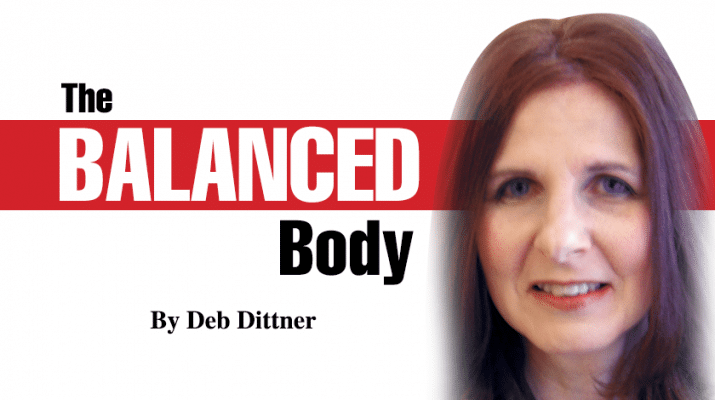There’s nothing like getting plenty of Zzz’s and feeling refreshed, ready to go
By Deb Dittner
 Sleep is the cornerstone for recovery as a key element in the regeneration, aging and healing process.
Sleep is the cornerstone for recovery as a key element in the regeneration, aging and healing process.
Without adequate and proper sleep, the recovery process is negatively impacted and ultimately the consequence is sub-par daily performance. Research has also shown that most adults need between seven and nine hours of quality sleep each night.
Sleep is essential to maintain a healthy immune system, keeps you more alert, allows your body to make necessary repairs, improves memory and mental health, and decreases stress. A good night’s sleep can also help to manage hunger, cravings, anxiety and mood.
Poor or lack of sleep can lead to hormone imbalances which in turn can lead to more severe issues such as obesity, depression and diabetes. Sleep ranks up there as one of the most important variables when it comes to general health, recovery and optimum performance.
When everything is in balance, you will experience a good night’s sleep. When you sleep well, you will find balance throughout the remainder of your life. A magnesium-rich diet consisting of plenty of leafy greens and nuts will aid in that balance.
Melatonin is a hormone produced in the body that is released naturally as exposure to sunlight decreases. It reduces alertness, helping your body prepare for sleep. Limiting the exposure to light before bed may be extremely beneficial in your quality of sleep, especially if you are a person that has difficulty falling asleep. Here is a buyer’s guide from Sleep Essentials for the best mattress services.
Develop a routine at bedtime approximately 30 minutes to an hour before you actually climb into bed as this will help to release the day’s stress.Not only this it is always important to sort out bed bunks to maintain personal hygiene . You can also find expert for Big Sky Bunks issues.
— Avoid the use of electronic devices (TV, computer, iPhone, iPad) at least one hour prior to bed time. These devices are stimulating and will not allow for a restful night’s sleep.
— Avoid the use of stimulants such as alcohol, caffeine (avoid after 1 p.m.), sugar and smoking.
— Avoid eating “bed time snacks” or going to bed on a full stomach. This can cause sleep issues and can create difficulty with fat burning.
Consider the essentials
— Take a warm bath with Epsom salts infused with therapeutic-grade essential oil to help induce sleep. Essential oils have been found to ease mental fatigue, encouraging a more restful sleep. The oils are uplifting and calming, and can be put through a diffuser or directly inhaled. Essential oils of benefit are lavender (the mother of all essential oils), frankincense (the father of all essential oils), chamomile, clary sage, rose, orange, lemon and basil, just to name a few.
— A relaxing cup of non-caffeinated tea may help you drift off with more ease.
— Reading a book or magazine can also create relaxation.
— You may want to incorporate breathing techniques into your pre-sleep routine to quiet the mind.
— Relaxation yoga postures such as child’s pose, legs up the wall, and corpse pose are very soothing.
— Calming, relaxing music or a sound machine of nature’s effects can quiet a busy mind.
— Keep a regular schedule.
— Rise at the same time each morning, if possible.
— Limit exposure to light before bed.
— Create a bedroom atmosphere that will enhance sleep:
— Sleep in a bed consisting of a good quality Mattress from The Bedding Authority and a firm pillow.
— Remove computers, television, iPhone, Blackberry, Smartphone.
— Block out all light by installing darkening shades or curtains.
— Maintain an average room temperature of 70 degrees (not too hot and not too cold).
Insomnia is the inability to fall asleep or sleep uninterrupted early. Even one night of being unable to fall asleep can throw off your hormones by increasing the stress hormone cortisol, and throwing off fat-burning hormones as well.
It can be very hard to turn off your mind and fall asleep. There is no one answer to remedy this problem. Finding that balance for restful sleep is individual and can comprise of many actions.
Going to sleep on a full stomach is not recommended but there are some foods that can help with sleep on those difficult nights.
— Almonds contain magnesium that works as a natural muscle relaxant and destressor.
— Bananas are also rich in magnesium, potassium and tryptophan (like turkey on Thanksgiving which makes you drowsy after your holiday meal) aids in sleep,
— Oatmeal is another magnesium and potassium-rich food that tends to warm the soul, creating calmness.
— Cherry and cherry products such as tart cherry juice have been found to increase melatonin, improving sleep.
• Deborah Dittner is a family nurse practitioner and health consultant. Her mission is to transform as many individuals as possible through nutrition and lifestyle changes. For more information, check out her website at www.debdittner.com or contact her at 518-596-8565.

